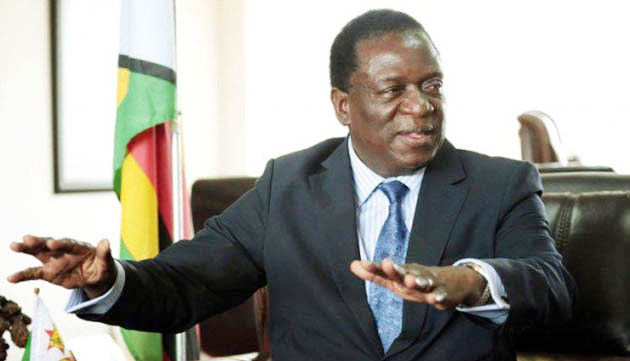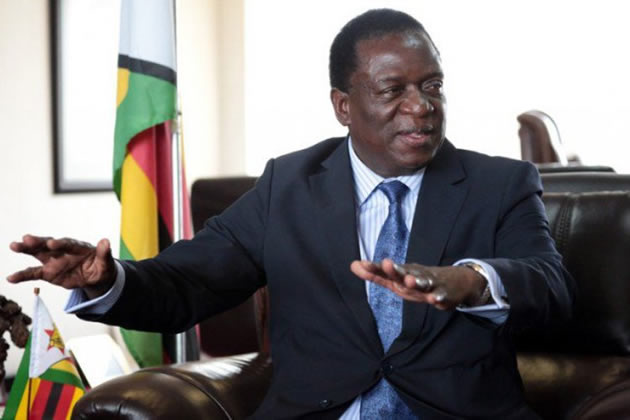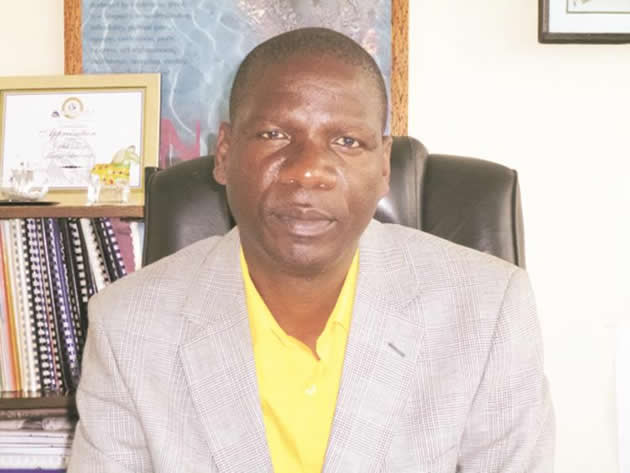Indigenisation not a threat to investment

Vice President Emmerson Mnangagwa (EM) recently visited the People’s Republic of China at the invitation of his Chinese counterpart. He was interviewed by the China Central Television (CCTV) where he explained to the broadcaster’s Han Peng (HP) that Zimbabwe’s indigenisation laws should not be construed as hindering foreign investment, among other things. The full transcript of the interview follows below.
HP: Your Excellency, we are very honoured to have you with us. Last August Zimbabwean President Robert Mugabe visited China and signed nine landmark deals with Beijing which many people say have provided much needed support for Zimbabwe’s economy such as the key sectors like railway networks, energy, telecommunications, so on and so forth. May I ask what is the status of these agreements now and how do they tie in with your visit this time to China?
EM: Well I am here in the People’s Republic of China at the invitation of the Communist Party of China as the Vice President, one of the Vice Presidents of Zimbabwe, invited by my counterpart to visit the Communist Party of China. But in relation to the specific question you have asked, it is true that our President Cde Mugabe visited the People’s Republic of China last year in August and indeed we were favoured by the response that the People’s Republic of China did to our President’s visit by signing several important and big agreements in terms of their being strategic to our economic recovery and growth.
Because of the size of those deals they cannot come into fruition overnight, but I am happy that several of them are work in progress and some like the South Kariba extension (are) already making progress; it is under construction. We have the Hwange Seven and Eight. The bidding process has been done and again a Chinese company has won that tender for the construction of a 600 megawatt plant in Hwange.
Then we have also in the area of infrastructure development, roads and railway networks which we need. In relation to railways, we need both the rehabilitation and refurbishment of our railway network. And with regards to the road network in Zimbabwe we need dualisation of the roads as well as opening other new roads that we need to have.
But all this process has to go through tender in terms of our laws and that is going on. So we are very grateful that the progress is there and I have no doubt that as these tender processes unfold we will be seeing the implementation, full implementation of most of these deals. The second constraint of course is that these deals will lend themselves to some model of financing. It depends on whether they are joint ventures, build to operate and transfer or they are joint ventures; depending on the model of the deal then the process is different.
HP: What is your mission to China this time? Is there any specific goal to try to achieve this time on your visit to China?
EM: The specific purpose of the visit was as a result of an invitation by my counterpart, the Vice President, both of the State as well as the Communist Party of China, to promote, deepen and strengthen our party-to-party relationship.
That is the relationship between Zanu-PF our political party in Zimbabwe and the Communist Party of China. But most importantly we have upgraded our cooperation agreement between the two political parties so that we as Zanu-PF are going to benefit in various areas of cadre training as well as support in developing and resourcing our activities in the party.
We have agreed on exchange programmes both in the Women’s League and the Youth League and the main body and secondly the Communist Party of China will support us in building our schools, where we will train our staff in running the party and some of the workshops will be held here in the People’s Republic of China. But above that the Communist Party of China has been able to influence the People’s Republic of China’s government to send experts under the National Development Reform Commission to be attached or assigned to the Office of the President and Cabinet in Zimbabwe to help us structure the roadmap or framework for development and recovery of our economy.
And already we have experts that are now in Zimbabwe and some, five of them, from the reform commission, will be in Zimbabwe from July 10 and on our side we have already identified up to 20 experts from about nine specific economic and strategic departments of government who are going to be trained in how to structure in fulfilment of Zim-Asset.
Because we know we have to see how to grow our primary economic sector that is agriculture, value addition and beneficiation in that sector. In mining again we need to beneficiate the products in the sector, infrastructure development, ICT; all these things.
We believe we also want to follow the path that the People’s Republic of China has followed in developing their economy. You introduced some 30 or so years back economic, special economic zones and we also want to introduce these in Zimbabwe so that each sub-sector of the economy will have relevant special economic zones relating to that particular area of the economy.
We also need industrial parks, financial centres, manufacturing sector and in all those areas we are going to benefit from the relationship which the Chinese government has afforded us through the reform commission technical experts that have gone to Zimbabwe.
HP: Of all these products that Zimbabwe is now seeking funding to, which part is the priority and how are they likely to transform your country’s economy?
EM: Realising that Zimbabwe has been under constraint for the last 15 to 16 years there is no area of the economy which you can say we are happy with. We are not happy with every aspect of the economy in Zimbabwe. Every aspect of the economy has suffered from the illegal sanctions imposed by the EU and the West.
So we are having a broad approach to the entire economy of the country to recover. This is why I have said we have to say this is where we want to go and how do we do it and then say in agriculture what do we need to do? In agriculture for instance we will need to empower our people whom we gave land during the land reform programme. We want to mechanise our agriculture and we want to be independent.
In doing so we will need companies to come to Zimbabwe to manufacture fertiliser in our country. We need electricity in that sector so we will need our roadmap to make sure we have energy because as the economy grows we already have a deficit in the area of energy, but then we need to plan now for three years, 10 years to come.
One, we must make sure we remove the energy deficit which is currently there. For instance I can give you the fact that the daily needs of power in our country is above 2 500 (megawatts) but our generation capacity is about 1 500(MW), so you can see the gap that is there which we fill through importation of power from our neighbouring countries. But we do have a three-pronged approach to make sure we have adequate energy in Zimbabwe. Either we have the hydro approach that is already there as I have mentioned, we have the Sino-Zimbabwe Chinese Company working on the Kariba South. That will bring on board about 300 megawatts of power. We have what we call Hwange Seven and Eight. These are the plants; thermal plants which we need constructed. Again that tender was won by a Chinese company I have been discussing with my colleagues here to persuade them to speed up the facilitation of funding for that purpose. That will bring on board another 600 megawatts of power. We also have two or so Chinese companies that are involved in the generation of power in the country. So you cannot say there are areas of our economy which we are happy with. (in terms of) Infrastructure we feel we are behind by 15-16 years. (In) Agricultural development we are behind by 15 to 16 years. Manufacturing, in fact capacity utilisation of our industry in some areas it is down to below 20 percent. So again we need to retool that industry by acquiring new technology, new machinery, new skills so that we are competitive and also in the same vein we have to look at how we can create an investment environment in the country which will attract the flow of capital from friendly countries and in fact capital is capital it will go where it finds comfort so we need to do that, ease of doing business in an environment. Those are the tasks which we face and we have to look at even legislation in the country. The social systems in the country, we have to reform. We are also looking at the reform measures which your country has gone through, this might also help us in the process of reforming our own systems in order to catch up with the current world practice so that we are part of the general globe world practices if we have to move forward with other people and that is what we are going to do. But of course we are very careful that we have been taught that as a nation and as a people we must always remain proud that we are Zimbabweans. We will not do anything that removes that pride. Whatever we do we, whoever comes to invest must recognise that we are a people, we are independent, we are sovereign.
HP: How do you assess China’s role in Zimbabwe talking about all these difficulties? What do you think the Chinese government and Chinese companies in Zimbabwe are performing to help you transform your economy to help upgrade the economy?
EM: Fortunately, as you began your interview you referred to the visit of President Mugabe when he came here and met the President of China, His Excellency Xi Jinping when they met, they agreed that China would assist Zimbabwe in reconstructing and rebuilding, revitalising its economy. Now the duty is on us the people on the ground, the ministers, the technocrats on both sides to make sure we realise the vision of our leaders in that direction. We know that China today is a powerful country both economically and politically it stands high with its head up because you have achieved what you have achieved by making sure you remain united as a people. There is stability in China, there is peace in China. Those are the ingredients which Zimbabwe must always strive to have. Internal peace which we do have, stability both politically and economically, more specially, politically we have. On the economic front it has been affected of course as I said by sanctions. Then that is the bedrock on which we can build our economy. Now your question is, what is China doing to assist us? As I have said China is ready, the burden now is on Zimbabwe to produce and present bankable projects. It could be in infrastructure, it could be in ICT, it could be in mining, it could be manufacturing, it could be in tourism, whatever. China is ready to support so this is the happy situation we have with our brothers and sisters of China.
HP: What policies has the government of Zimbabwe put forward to safeguard the interests of the investors because many investors in China would cite the controversial policy in Zimbabwe on the indigenisation policy? So my question is how do you keep a balance of safeguarding the investors interests while making sure that the local economy of Zimbabwe is being developed?
EM: Indigenisation does not threaten investment, not at all. There has been an attempt by the West to portray indigenisation as nationalisation that is not correct. What is correct is we have to distinguish the resources which we have in our country, we have resources that are depletable; take gold, take platinum take coal, take any mineral, it is a depletable resource which when you begin exploiting it, it may last 10 years, 15 years, 20 years, but it will get depleted and you cannot regenerate it, it is depletable. Other investment, infrastructure development, construction of roads, railways, factories and so on are not depletable. So we are saying with regard to the areas of depletable resources we would want our country to have benefits. We must structure such arrangement as to make sure there is benefit to Zimbabwe because the resource after some time will be gone. This is where we are talking about 51-49 percent (equity). But in other sectors on the economy is depends if somebody wants to come to put McDonalds what he wants is to find a building, rent and bring in equipment and in three months he is making chicken and selling right? But if you came wanting to mine say platinum in Zimbabwe it may take you three to four years and by that time you have already sunk up to $200 million, $400 million in order to do the research, the drillings and put infrastructure, so we cannot treat the two together and say no the investment burden is the same, it is different. So, we are depending on what sector of the economy you are coming in, yes. But if you want to come in and have a barbershop to cut people’s hair, we say this area is reserved for the locals if you are going to do it make sure you have a partnership with a local person. So those are some of the things but there has been an attempt to a greater extent almost a succeeding by the West to portray our indigenisation approach as negative. Why do we have this indigenisation? It is because we have gone over a period of 100 years when our resources had been taken by the British, the colonial masters owning our own resources. So when we became independent we wanted to unite our resources with us the owners of the resources so that the resources belong to us and we belong to the resources. This is the theory we have as a people with regard to what I have said are depletable resources. But of course we must know that investments can only go where it gets a return so we must make sure we create an environment where investors are happy to put their money because they will have a return. So the question of indigenisation frightens people because they read Western papers but when they come to Zimbabwe and sit down with us, they will be more than happy to invest in Zimbabwe. And the question of repatriation of their profits again it’s open. We now use the US dollar so there is no question of hard currency, that is the hard currency, we have the current hard currency of the world and I can assure you that Zimbabwe is a good destination for investment. Whatever sector of the economy you may have in mind.
HP: Over the past few decades, the European Union has had long term sanctions on Zimbabwe for a long time but since three years ago they have been trying to scale down the sanctions on Zimbabwe. Some say that this is because the EU believes that the political and economic environment in Zimbabwe is now getting better but others say it is simply because the EU finds that they didn’t really achieve their goal with their sanctions. So what do you think is the reason behind their significant climb down on Zimbabwe?
EM: The point is in the first place there was no reason (to impose sanctions). They had no reason to impose those sanctions. In terms of the United Nations Charter, sanctions can only be imposed on a state that is a threat to international security. Zimbabwe has never been a threat to international security. We are a peace loving nation. We are a stable country. They took this matter to the United Nations Security Council, it was thrown out but the gang of (former US President) George (W) Bush and Tony Blair of England came together as cowboys and imposed these sanctions on us. Tony Blair was able to hoodwink Europe, the EU to support Britain to impose sanctions on us and the quarrel was bilateral between us and the British and not with Europe, but they were able to be hoodwinked by the British to impose sanctions on Zimbabwe. On the other hand, the Americans, we had this George (W) Bush, who at the time was intending to invade Iraq and he needed support of the British. He lost his case at the United Nations Security Council to invade Iraq but then he tried to put a coalition of the willing and Britain under Tony Blair was one of the countries who subscribed to the coalition of the willing and in exchange Britain supported George Bush to invade Iraq while George Bush supported Tony Blair to impose sanctions on Zimbabwe. None of these activities was justifiable. All was illegal in terms of international law. So the climb down, they are doing everything possible, finding some ladder to climb down, by making various attempts, “oh now we think that there is rule of law in Zimbabwe,” it has always been there but they must find a ladder to climb down on and this is what they are doing. But we as Zimbabweans we have never offended the people of France, we have never offended the people of Germany, or the entire EU. Yes, the British offended us (but) we never offended them; they offended us by taking our land. And when we took our land back, they got offended because we took what they had stolen. And just think of the thinking of a person, who gets angry because the owner of article that you have has taken it back, which you had stolen and they get angry. So we have no concern about them, we will continue to move forward as a nation. We will continue to move forward with those who respect us, those who realise that we are also a nation, we have to chart our destiny with the countries that can support us, the countries who respect other nations like China, we will move forward. They would have hoped that during the 15 or 16 years of sanctions we would collapse. Yes indeed they collapsed our economy but they never collapsed our resolve to remain independent. That no one can do.
HP: What impact have the sanctions really caused if we go into detail and how did Zimbabwe cope with that?
EM: Well the major significant collapse that they achieved was to kill our currency. In the year 2000 we still had our Zimbabwean currency when they imposed sanctions. But overnight they withdrew balance of payments to the extent of 46 percent of GDP which meant that 46 percent of our programmes in the country had no financing because these were dependant on the IMF, the World Bank and other international financial institutions. That collapsed because they immediately cut, they immediately stopped so our currency collapsed to the extent that it was almost useless to buy anything. Then in 2009 I think 2009, 2008 in December we made a resolution to adopt their currency. Then in February 2009 we announced that resolution. Since then they have not yet found a formula of attacking their own currency which we are using.
HP: Is there any other thing that is being harmed by those sanctions that have hounded Zimbabwe?
EM: Oh yes. Our education system, our health system, infrastructure system, in fact across the board. For instance, I am from the military, most of our army equipment, air force equipment was British related, so they cut and we could not get spares for aircraft, we could not get spares for army pieces in the army. We could not get spares in industry, manufacturing industry, the factories, the manufacturing plants in the country, these machinery were coming from the West, so they stopped, we could not acquire or access new spares or even acquire to retool our factories and so in that area we are 15/16 years behind in terms of technology. We are only beginning now to do our best to cooperate with countries outside those who have imposed sanctions on us in order to retool and bring in new machinery and so on. So it was not only the currency that suffered, across the board there was an effect of the illegal sanctions. In medicine and so on we were not able to access medicine because the production chain, trade chain was related to our diplomatic and relations chain which was historical which now we have been able to shift and change so that we are not tied to the former colonial power.
HP: Some say exactly because of the Western sanction on Zimbabwe that shaped the current ties between China and Zimbabwe, what is your take on that?
EM: No, those people have very little understanding or knowledge of history. 60 years ago no one thought about China to one day become a power it is today. It was a rural country ignored by the West. Despite the population it had it was not even a member of the Security Council, it was denied that. But today can you tell me one simple country on this planet which can ignore China? None. Everybody recognises China. It is now the second biggest economy in the world. Even militarily no one can ignore China. You have grown up, you have made your mark. How? Because you have resolved to develop yourselves. You have not depended on anybody but yourselves. You have done your own research and development, you have construction, you have modernised your own agriculture, you have modernised your own infrastructure development in the country, roads, railways, airlines, all is done by the Chinese themselves, they have done that. Your own education, you have developed it and today you are a proud people. Even the level of the standard of life of the people of China has developed, has grown. This is why you are respected. So even us today, we are where we are down there but as long as we remain resolute, united, peaceful and stable, no one can stop development. With the support of countries like China, like Russia, like India, like Brazil, we are going rise and be ourselves. So that is what is there.










Comments